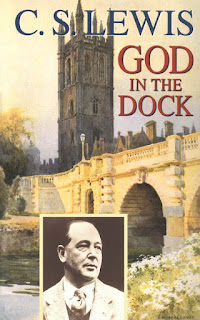C.S. Lewis did much of his best
writing and reflection in the era during and after the Second World
War. This essay ("The Dangers of National Repentance") was written in response to a drive to declare a
national repentance and confession of sin in England for their part
in guilt for the war.
A Summary of Lewis'
thesis:
“They are ready to believe that
England bears part of the guilt for the present war, and ready to
admit their own share in the guilt of England.”
But Lewis wonders:
“What that share is, I do not find it easy to determine.”
and
goes on to ask: “Are they, perhaps repenting what they have in no
sense done?”
A few more relevant lines:
“Men fail so often to repent their
real sins that the occasional repentance of an imaginary sin might
appear almost desireable.”
But Lewis then goes on to illustrate the
perils of doing so: "The young man who is called upon to
repent of England's foreign policy is really being called upon to
repent the acts of his neighbor.”
So that: “The first and fatal
charm of national repentance is, therefore, the encouragement it
gives us to turn from the bitter task of repenting our own sins to
the congenial one of bewailing – but first of denouncing – the
conduct of others.”
Lewis goes on to reflect that: “A
group of such young penitents will say, 'Let us repent our national
sins': what they mean is 'Let us attribute to our neighbor (even our
Christian neighbor) in the Cabinet, whenever we disagree with him,
every abominable motive that Satan can suggest to our fancy.”
This doesn't mean that Lewis rejects
that there may be a need for national repentance, or that national
repentance may need to be preached by the church ("It think it is" says Lewis). Rather, Lewis goes
on to say that national repentance may be necessary, but only with a
discharge of “reluctance.” Just as one should not gain too much
delight out of rebuking one's mother.
RELEVANCE:
To each of my readings, I hope to give
some reflections to how this might be relevant to the current
question before the PCA in regards to a denominational repentance. Though I would also recommend on this essay to read it for yourself, since the essay is short (5 pages). I think all PCA
elders would gain something from reading it. My
numbered reflections on Lewis' essay:
FIRST: Lewis in my opinion is right
to warn of some of the self-righteous dangers of an endeavor of group
repentance. Often this can be confessing the sins of one's neighbor,
rather than your own sins. In those cases “we” really means
“they.” Thus, there must be some reflection on the personal
nature of such a confession. Is this the confession of a true acting
collective whole, or the acting of one group or generation against
another? Lewis warns of the violation of the Fifth Commandment if one
is labeling something sin that is not, or just airing the sins of
one's fathers unnecessarily. So two lessons from this point:
1. One must be careful that in covenantal repentance, you are not confessing the sins of others, especially without their permission.
2. One must guard against passion for the sins of others, that distracts from one's confessing of your own sins.
1. One must be careful that in covenantal repentance, you are not confessing the sins of others, especially without their permission.
2. One must guard against passion for the sins of others, that distracts from one's confessing of your own sins.
SECOND: On the other hand, Lewis is also right to say
there can be need of national repentance. Nothing in Lewis' essay,
nor in the Scriptures, bars national repentance or what I would call "covenantal repentance" of a group body. If a group is constituted as a
collective, and acts for the whole, then it commits acts for good or
ill. Those acts should either be celebrated or repented of,
respectively. Thus, there comes times when a group must repent of
sinful acts and actions taken by the whole. The Lesson:
- Covenantal repentance is valid, yet even when necessary must do so, it should have a tone of solemness and perhaps reluctance. We ought to honor our fathers, even if we must confess their and our iniquities as one body.





